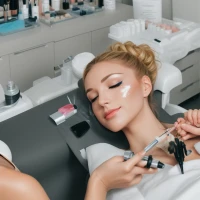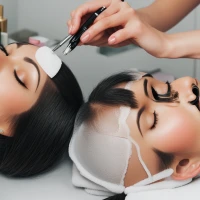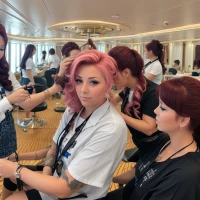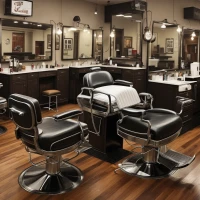The beauty industry is a kaleidoscope of professions, each with a charm and specialty that contributes to the endless pursuit of beauty and wellness. As we dive into the nuanced world of beauty professionals, we often encounter two key players whose roles are frequently misunderstood and shadowed by beauty myths: cosmetologists and estheticians. The intricate tapestry of services they offer weaves a story of transformation, rejuvenation, and self-care, with each thread representing the skill and expertise that define their unique positions in the beauty landscape. Whether it’s the long-standing confusion between the two professions or the evolving trends that shape their practices, understanding the difference between a cosmetologist and an esthetician is crucial for anyone looking to advance in the beauty industry or seeking to refine their self-care regimen.
Below, we unravel the beauty myths and lay bare the distinct roles of cosmetologists and estheticians. By the end of this journey, you’ll find clarity in the blurred lines and discover how each professional can enhance your beauty narrative.
The Essence of Beauty Expertise
Entering the world of beauty expertise requires a deep dive into the knowledge, techniques, and specializations that define cosmetologists and estheticians. They are not just beauty enthusiasts; they are trained professionals who can transform one’s appearance and wellbeing.
Related article; Why a Career as an Esthetician is Right for You
Who is a Cosmetologist?
Cosmetologists are the artisans in the beauty industry, boasting a broad spectrum of skills that include hair styling, coloring, cutting, and sometimes extending to nail treatments, makeup application, and basic skincare. Their training is comprehensive, offering a plunge into various aspects of beauty enhancement.
Comprehensive Skill Set
- Hair design, cuts, and chemical treatments
- Color theory and application
- Skin care basics
- Manicures and pedicures
- Makeup artistry
Who is an Esthetician?
Estheticians, contrastingly, are specialists of the skin. Their realm is the epidermis – the outermost layer of the skin. They provide services focused on skin health, facials, chemical peels, microdermabrasion, and other skincare treatments meant to improve or maintain the skin’s appearance and health.
Specialized Focus
- Customized facial treatments
- Skin analysis and care regimens
- Advanced skincare techniques like microdermabrasion
- Hair removal methods
Clarifying Beauty Myths
The beauty industry is awash with myths and misconceptions, particularly when it comes to differentiating between cosmetologists and estheticians. Let’s clarify some common misunderstandings.
Related article; Becoming a Freelance Makeup Artist
Myth 1: Cosmetologists and Estheticians Perform the Same Work
The belief that cosmetologists and estheticians are interchangeable is unfounded. Although both professions might overlap when it comes to basic skincare services, their primary focus and the extent of services they provide differ greatly.
Related article; Career Opportunities for Barbers
Myth 2: Advanced Skincare is in the Cosmetologist’s Realm
Estheticians are the true custodians of advanced skincare treatments. Their expertise allows them to perform services that go beyond the foundational skincare knowledge of a cosmetologist.
Related article; How to Become an Esthetician
Educational Pathways and Certifications
To appreciate the depth of knowledge each professional holds, it’s essential to look at their educational backgrounds and the certifications they acquire.
Related article; Should I enroll in a nail tech program?
Pathway to Becoming a Cosmetologist
To become a cosmetologist, one must attend an accredited cosmetology school, which can take between one to two years, depending on the program and state requirements. Following this, they must pass a state licensing exam.
Related article; How Long Does it Take to Complete a Cosmetology Course?
Core Subjects in Cosmetology Education
- Hairstyling
- Haircutting techniques
- Hair coloring
- Basic esthetics
- Nail services
Pathway to Becoming an Esthetician
Estheticians have a more focused educational track that centers around skin health and beauty. The training usually takes six months to a year, followed by a state licensing exam.
Related article; Beauty School Admission Requirements
Key Areas of Focus in Esthetician Programs
- Skin science
- Facial treatments
- Skin disorders
- Hair removal techniques
- Makeup application
Delving into Services Offered
A more detailed look at what services cosmetologists and estheticians offer can help to further delineate their distinctive roles.
Related article; Why you should consider a career as a hairstylist
Cosmetologist Services
Cosmetologists provide a wide range of beauty services, with their versatility being one of their greatest assets.
Examples of Services
- Trendy haircuts and hairstyles
- Hair coloring, highlights, and balayage
- Manicures and pedicures
- Basic facials and skincare advice
- Professional makeup application
Esthetician Services
When it comes to skincare specialties and more delicate treatments, estheticians shine. Their focused expertise allows them to offer advanced skin-enhancing services.
Esthetic Treatments and Techniques
- Deep cleansing facials
- Exfoliating treatments like peels
- Acne and anti-aging procedures
- Lash and brow tinting
- Waxing and other hair removal techniques
The Impact of Trends and Technology
The explosion of interest in skincare and beauty has seen the roles of cosmetologists and estheticians evolve. Both professionals must stay abreast of the latest trends and technologies to maintain relevance and offer the best services.
The Influence of Social Media and E-commerce
Social media has not only amplified the reach of beauty professionals but has also served as a critical platform for education and marketing. Meanwhile, e-commerce has made professional-grade products more accessible, affecting the services offered in salons and spas.
Advancements in Beauty Technology
Cutting-edge technology in beauty tools and products has revolutionized the industry, allowing for more sophisticated procedures and results which professionals must be adept at handling.
Career Outlook and Opportunities
For those interested in a career in the beauty industry, understanding the future prospects for cosmetologists and estheticians is crucial.
Employment Growth and Specialties
Both cosmetologists and estheticians face favorable employment growth, with opportunities to specialize further within their fields. Estheticians, for instance, might delve into medical esthetics, whereas cosmetologists could branch into image consultation or product development.
Conclusion: Making Your Choice
Whether you’re contemplating a role in the beauty industry or seeking services for self-enhancement, distinguishing between a cosmetologist and an esthetician is essential. Remember:
- Cosmetologists offer a broad range of beauty services with an accent on hair.
- Estheticians dedicate their practice to skincare and specialized treatments.
By understanding the unique skills and services that each professional provides, you can make informed decisions that align with your career aspirations or personal beauty goals. The beauty industry thrives on diversity, specialization, and the constant pursuit of excellence – whether tending to locks of hair or the intricate needs of the skin, these professionals elevate the beauty narrative to new heights, and in doing so, reveal the best version of us all.










